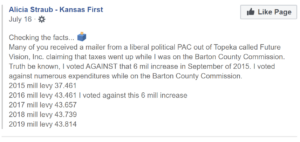Kansans recently received mysterious mailers from a group called Future Vision attacking multiple Kansas Senate candidates, and this prompted questions about who is behind the effort and why. The targeted candidates we spoke with also claim that the mailers misrepresent their positions.
According to the Business Registry at the Kansas Secretary of State’s office, Future Vision, Inc. is a nonprofit organized under the IRS code as a 501(c)(4). Its president is Gary Yager, president of the Topeka-based Vision Bank, and its secretary is William Sneed, a Topeka attorney and lobbyist.
Several people contacted the Sentinel, alleging that Senate Vice President Jeff Longbine (R-Emporia) is somehow associated with Future Vision. We wrote to Senator Longbine and both Future Vision officials asking about the affiliation and the focus of their mailers, but none of them responded to these questions:
- Please provide a list of candidates who are mentioned in your mailers and other communication this year, along with a sample mailer or communication.
- As a 501(c)(4), you can’t officially endorse or oppose, but the mailer below targeting Alicia Straub makes it pretty clear you oppose her. How do you decide whether to criticize or to send favorable messages about candidates? Is it conservative vs. moderate/liberal, for example?
- Please confirm whether Senator Longbine has any relationship with Future Vision, Inc., and if so, please describe his role.
- Do any other state or local elected officials have any connection to or relationship with Future Vision, Inc.?
We deliberately didn’t ask who funds Future Vision because the U.S. Constitution protects the constitutional right of all Americans to private free speech (as do the donors to the Sentinel and our parent company, Kansas Policy Institute); this right was affirmed in the segregation-era case NAACP v. State of Alabama. The intended goals and activities of the organization, however, are fair game. (See the mission statements of the Sentinel and Kansas Policy Institute here and here.)
Senate President sets the policy agenda
Current Senate President Susan Wagle isn’t seeking re-election, so the Senate will have a new president next year. Because the president appoints committee chairs and assigns members of his or her party to committees, whoever is elected president by members of the majority party will have significant control over the policy agenda. And with Kansas in its fifth consecutive decade of economic stagnation and facing a $1.5 billion budget deficit next year, there’s a great deal at stake.
Several senators tell the Sentinel they believe Jeff Longbine and Ty Masterson are considering running for Senate President. Longbine didn’t respond to our email, but Masterson confirmed in a phone conversation that he is considering it.
“Right now, I’m focused on winning my re-election to the Senate. If I’m successful, then yeah, I’ll consider it.”
Asked if, like some people believe Jeff Longbine is doing, he’s helping other senators get elected – politicians routinely work on behalf of other candidates – Masterson said as a member of the Truth Caucus, he’s trying to get the truth out about senators’ voting record.
“I’m not saying elect or don’t elect so-and-so. I’m just helping people understand how their elected officials voted in the past. Sometimes, what they say and how they vote aren’t the same.”
Masterson says as Senate President, he would direct committee chairs to close the state’s $1.5 billion deficit without raising taxes.
“No tax increase. Reduce spending and re-allocate resources by working through the committee process.”
Misleading claims
One of Future Vision’s mailers targeted Rep. Alicia Straub (R-Ellinwood). Straub is running for the 33rd Senate District against the incumbent, Mary Jo Taylor (R-Stafford).
Straub says the mailer’s claim that property taxes increased 13% “on her watch” implies she voted for a big property tax increase while serving as a Barton County commissioner. She says she’s fielding questions from concerned residents about the allegation. Straub told the Sentinel in a phone interview that the mailers deliberately misstate the facts and they don’t disclose that she’s on record voting against the six mill increase.
 “If the mailers said taxes went up 13% on my watch but I voted against the six mill increase, fine. That would be truthful.”
“If the mailers said taxes went up 13% on my watch but I voted against the six mill increase, fine. That would be truthful.”
Straub’s Facebook post shows the mill rate remained steady following the 2016 increase she voted against. It went from 37 mills to 43 mills and they stayed in the 43-range the next few years. Her post also says she “voted against numerous expenditures while on the Barton County Commission.”
State Senator Mike Thompson (R-Shawnee) was also the target of a Future Vision mailer. In one claim, they accuse him of “refusing to fund education and schools” based on his vote against Senate Bill 66.
Thompson, in an email to the Sentinel, says he voted against SB 66 because it spent a lot more money than even Governor Kelly requested, and at a time when legislators knew the economy would be shut down.
“It made no sense to vote to increase spending at a time when we would be shrinking the number of Kansas taxpayers due to job losses….and shrinking the number of businesses that would be open and operating and contributing to sales tax revenues. In my opinion, it was more prudent to consider cutting spending at that point as it was clear that the devastation to the state economy would be enormous.”
SB 66 increased General Fund spending to a little over $8 billion for this fiscal year and about $193 million over last year. Official revenue estimates say budgeted spending this year would exceed tax revenue by about $640 million ($8.024 billion spending vs. $7.384 billion tax revenue).

Thompson says it is “completely duplicitous” of Future Vision to claim his vote on SB 66 was against education funding.
Possible motivation behind the attacks
Future Vision officials won’t say why they sent the mailers, but Straub and Thompson think it’s probably because of their conservative voting record and referenced their Freedom Index scores.
Alicia Straub has a lifetime score of 87% on the Kansas Policy Institute Freedom Index, which tracks legislators’ votes for the purpose of providing educational information to the public about broad economic and education issues that are important to the citizens of our State. It is the product of nonpartisan analysis, study, and research and is not intended to directly or indirectly endorse or oppose any candidate for public office.
A score of 100% indicates always voting for constitutional protections, student-focused education, and other covered issues, 50% would be neutral, and a score of zero percent would indicate always voting against those issues.
Straub’s primary opponent, Mary Jo Tayler (R-Stafford) has a 44% lifetime score. Rep. Tom Cox (R-Shawnee) is running against Mike Thompson in the primary; Cox has a lifetime score of 46% and Thompson scored 93% this year is his first legislative session.
Ty Masterson has a 70% lifetime score on the Freedom Index and Jeff Longbine is at 50%.
We’ll update this story if Senator Longbine or the officials of Future Vision, Inc. respond to our inquires.



